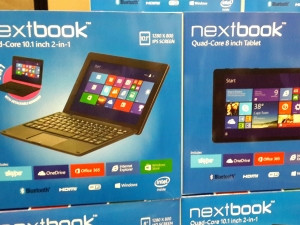
Microsoft has joined SA's low-cost device wave, bringing two new tablet devices dubbed Nextbook - an 8-inch tablet and 10.1-inch hybrid device - to the local market, in conjunction with local retailer Makro.
Microsoft SA says this is the next step in its local contest for South African consumers, and one it believes will be a turning point for the market.
The 8-inch quad-core Nextbook will retail from Makro stores at R1 499, while the 10.1-inch quad-core two-in-one tablet and hardcover keyboard will cost R2 999.
Microsoft notes that demand for tablets remains relatively high within developing regions - including SA - where local consumers "crave larger screen mobile devices". The Nextbooks, says the company, are among the first Windows Reference Design devices that will be available in SA and are available from Makro as of today.
Melanie Botha, consumer channels group executive at Microsoft SA says the devices include the full Windows 8.1 operating system (OS), which provides access to over 700 000 applications "The Nextbooks also come with unlimited OneDrive storage for a year and 60 Skype world call minutes per month for the duration of the subscription period, which is a year."
Both devices feature 1GB of RAM and 16GB of expandable storage, while the 10.1-inch and 8-inch tablets have 6 000 mAh and 4 000 mAh batteries, respectively. The devices are WiFi enabled, but do not feature 3G capability - a feature Microsoft says is waning in popularity, due to the proliferation of WiFi hotspots and smartphones that can act as mobile hotspots.
The 10.1-inch Nextbook comes with its own hardcover soft-touch keyboard, which also features a trackpad.
Kevin Maier, merchandise manager for Makro SA, says the price-points of the Nextbook devices make tablets more accessible to a larger section of South African consumers.
Lowering costs
Anthony Doherty, Windows Business Group head at Microsoft SA, explains Microsoft's strategy when it comes to making devices more affordable.
"In addition to introducing freemium models of Windows to smaller sized devices (9" and below) to make them more affordable, other steps have been taken to ensure Microsoft has created a competitive ecosystem."
He says the company has included different manufacturers and altered a few engineering standards such as allowing original equipment manufacturers to do their own internal verification, re-engineering Windows to be able to run on smaller hard-drives, while specifying an SD card slot to enable users of these devices to increase storage as needed.
Although Microsoft says plans are in the pipeline for 3G models, it notes there is a "massive swing away from 3G" and removing the complexities that come with including a 3G SIM slot also helps keep prices down.
Share